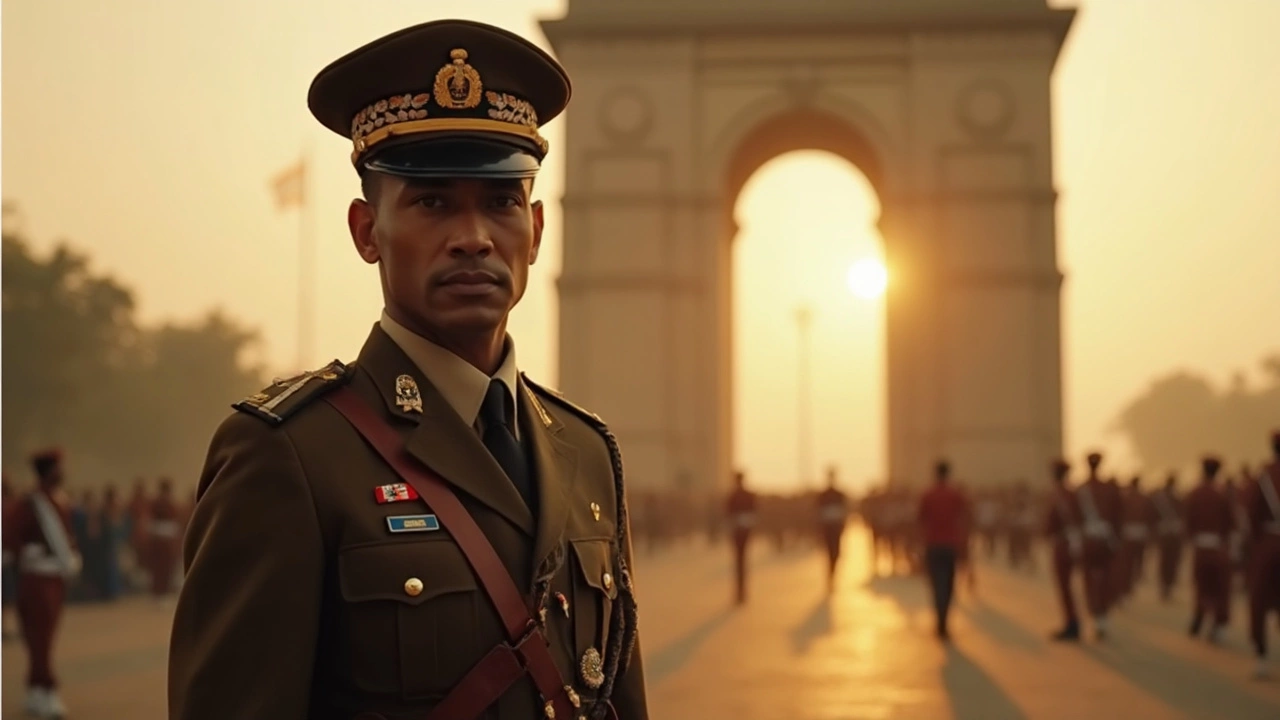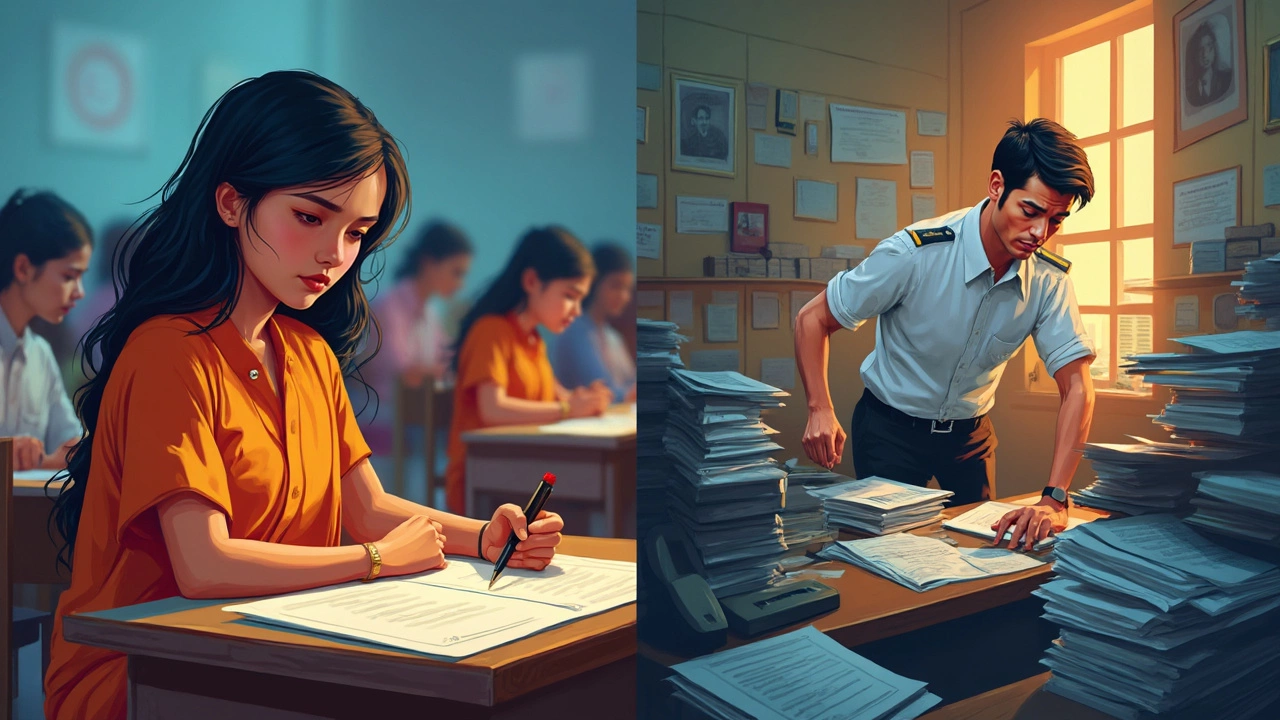
Not all government jobs are made equal. Some look cushy from the outside, but if you peek behind the curtain, you’ll see insane competition, ridiculous workloads, and pressure that can eat you alive. Think IAS, Defense services, or even certain technical jobs where a slip-up can have national consequences.
So, what actually makes a government job tough? It’s not just about cracking the exam; it’s the mental grind, the crazy-long training, and the “always on call” lifestyle that follows. If you’re eyeing these posts, start by asking yourself: is it the prestige and power, or can you really handle the heat?
- Why Some Government Jobs Are Tougher Than Others
- Civil Services: Not Just IAS, IPS, and Beyond
- Defense & Armed Forces: Where Only the Tough Last
- Lesser-Known Challenging Roles
- Tips to Survive and Thrive in Tough Government Jobs
Why Some Government Jobs Are Tougher Than Others
Ever wondered why certain government jobs are called the toughest out there? It’s not just about the flashy title or the respect. The biggest reason: the super stiff competition and what you have to go through just to get in. If you check out the number of applicants for roles like IAS or Armed Forces, it often runs into lakhs competing for just a handful of openings. Getting to the finish line is crazy hard.
But that’s not all. Here’s what ramps up the difficulty:
- Most difficult government jobs demand marathon-length exams—like the UPSC Civil Services test, which stretches over almost a year with Prelims, Mains, and Interview rounds. For reference, in 2024, 11.5 lakh candidates applied, but less than 1,000 made it through.
- Training isn’t just bookwork. For armed forces, probation is hardcore. In academies like NDA and IMA, cadets are pushed to their physical and mental limits every single day.
- The actual work doesn’t get easier. You might get transferred all over the country, even the remotest, toughest places. Officers sometimes get less than four hours of sleep or deal with emergencies at midnight.
- Decision-making is stressful. Whether it’s handling a disaster, making police calls, or even day-to-day admin, a wrong call can make headlines, or worse, risk lives.
If you want a quick look at just how tough the gateway is, check this out:
| Exam/Position | No. of Applicants (2024) | Selection Ratio |
|---|---|---|
| IAS (UPSC CSE) | 11,50,000 | Less than 0.1% |
| UPSC CDS (Defence) | 3,00,000 | About 1.2% |
| SSC CGL | 30,00,000 | Around 0.5% |
Basically, tougher government jobs aren’t tough because they need you to memorize a lot. It’s a mix of brutal selection, long training, and the everyday grind once you’re in. If you want to go for one of these, be ready to test your patience, energy, and sometimes, your sanity.
Civil Services: Not Just IAS, IPS, and Beyond
When people talk about tough government jobs, they instantly think of the big ones like IAS or IPS. But civil services aren’t limited to just these. There's IRS, IFS, and a bunch of other roles, all packed with crazy-high expectations and challenges most folks don’t see coming.
The most difficult government jobs in this sector have an entrance wall that basically filters out almost everyone. The UPSC Civil Services Exam, which covers IAS, IPS, IRS, IFS, and other services, had over 10 lakh (1,000,000) applicants last year. Out of those, only around 700 candidates made it through to top posts. That’s less than a 0.1% success rate.
| Service | Posts Filled (2024) | Average Training Duration |
|---|---|---|
| Indian Administrative Service (IAS) | 180 | 2 Years |
| Indian Police Service (IPS) | 150 | 2 Years |
| Indian Foreign Service (IFS) | 40 | 2.5 Years |
| Indian Revenue Service (IRS) | 100 | 1.5 Years |
The battle doesn’t end once you clear the exam. You’ve got months of tough training. After that, you hit the ground handling real-world problems—managing floods, riots, or corruption cases—not sitting in a chill office doing paperwork. Transfers are common, work-life balance is usually a myth, and everyone expects you to have answers to everything.
- Most civil servants deal with political pressure and unpredictable, high-stress situations daily.
- If you think the hard part is over after the exam, think again—most say the real challenge is surviving in the field.
- Long hours and frequent moving to new cities means your personal life takes a hit.
A small tip: If you’re gunning for civil services, build your mental stamina from day one. Don’t just study hard; practice decision-making, handling stress, and talking to regular people. That’s the real skill nobody tells you about in coaching classes.

Defense & Armed Forces: Where Only the Tough Last
If you ask someone which government job really hammers the mind and body, most people point straight at the defense and armed forces. Not surprising. Grab the UPSC NDA, CDS, or even Indian Coast Guard entry – the process itself weeds out thousands in just a few rounds of tests and physical challenges.
People often focus on the gruelling training, but that’s just where it starts. Here’s what you’re in for:
- Physical fitness: Minimum criteria aren’t just formalities. Sprinting, push-ups, pull-ups, swimming, obstacle courses – you’ve got to clear all of them, every time.
- Mental pressure: You’re away from family, sometimes in tough, remote areas for months. The lifestyle isn’t for everyone – it takes a toll.
- Leadership & decision-making: There’s zero room for messing up when you’re leading men in real situations, sometimes during disaster relief or border tension.
- Career uncertainty: Not knowing what posting you’ll get next, where in the country you’ll land, keeps you on your toes 24/7.
Check out these real numbers for a quick reality check:
| Entry | Applicants | Selected | Selection Ratio |
|---|---|---|---|
| NDA (2024) | 6,50,000+ | ~5,200 | 0.8% |
| CDS (2024) | 2,80,000+ | ~7,500 | 2.7% |
A lot of people think the pay and perks make up for everything. But ask an Army officer, and they’ll tell you it’s the pressure that never cools off. Long hours, zero routine, and work conditions in everything from snow-capped Siachen to burning Rajasthan deserts.
If you’re actually aiming for a place here, focus hard on most difficult government jobs for your research. Prepare seriously for SSB interviews, which test your nerves more than your memory. Fitness is not optional – make running and strength work a part of daily life, even before you think of filling the form.
The hard part doesn’t end with the exam or the training. It’s a daily test of grit and flexibility that few jobs can match.
Lesser-Known Challenging Roles
Everyone talks about IAS and defense jobs being the hardest, but there are plenty of government posts that fly under the radar and are actually brutal to crack and survive. Some of these don’t get the limelight, but the people in these roles pull off serious heavy-lifting every day. Let’s check out a few that might surprise you.
Take the Indian Forest Service (IFS) officers. Most people don’t even know how tough this job is. IFS officers aren’t just watching trees — they deal with tricky political interference, wildlife criminals, local conflicts, and disasters like forest fires or floods. They’re often posted in remote places with almost no facilities. An IFS officer once told me his field post didn’t have mobile signal for days. Still think it’s an easy gig?
Now, let’s talk about Indian Revenue Service (IRS) officers. These guys handle tax raids, fight corruption, and deal with a ton of pressure from all sides. A lot of them work late nights and face direct threat from the people investigated. It’s not the kind of job you see on shiny posters, but it’s critical for the country’s economy.
People usually overlook jobs like Sub-Inspectors or Assistant Commandants in paramilitary forces. It’s not glamorous, but these posts come with crazy field duty, riot control, border management, and often direct encounters with armed criminals. There’s less desk work, more running on the ground. Promotions are slow; transfers happen anytime. Many spend years separated from families.
In all these roles, you’ll see a common theme: high work demands, huge accountability, and pretty low public recognition. Here’s a quick look at some less popular but really tough government jobs and their challenges:
| Role | Main Challenges | Work Location |
|---|---|---|
| Indian Forest Service (IFS) | Remote postings, wildlife crime, environmental disasters | Forests, rural or tribal areas |
| Indian Revenue Service (IRS) | Tax evasion crackdowns, corruption cases, safety risks | Urban & semi-urban |
| Sub-Inspector/Assistant Commandant | Riots, border security, anti-smuggling, long field duty | Border, conflict zones, cities |
| District Disaster Management Officer | Emergency response, disaster relief, 24x7 on-call | Anywhere, rapidly changing |
| Mining/Geology Officers | Hazardous fieldwork, regulation enforcement, illegal mining cases | Remote mines, hilly terrain |
If you’re going for any of these jobs, be clear about the reality behind the title. It’s a grind, but for the right person, making such a concrete difference can be worth every tough day at work.

Tips to Survive and Thrive in Tough Government Jobs
Losing steam is easy when you're in jobs like IAS, IPS, or defense services, where expectations are sky-high and days can stretch into nights. So, how do the top performers keep going? It’s not magic—it’s practical habits and a focus on what matters most. If you’re aiming for the most difficult government jobs, remember, tough times will come, but you don’t have to break.
- Learn to Prioritize Fast: Your to-do list will always be packed. Sort what’s urgent, what can wait, and say no when you need to. IAS officers often handle 30-40 files daily—decisions need to be quick and clear.
- Build a Reliable Network: Friends in other departments, a mentor, or a group you can vent to can make a huge difference. In the police and army, strong team bonds literally save lives.
- Take Breaks—Seriously: Burnout is real. Even senior officials admit that just a 10-minute walk or a cup of chai with colleagues can refuel you. It’s not wasted time; it’s how you stay sharp.
- Stay Updated: Policies change, and new technology comes in every couple of years. People who keep learning on the job find it easier to adapt, whether it's a new tax rule or an upgrade in defense software.
- Don’t Ignore Health: Data shows police service officers have 30% higher risk of hypertension than the general population. Small things—like doing yoga or quick workouts—make a huge difference over the years.
If you’re juggling family, work, and study, try breaking your days into small chunks. Aisha once helped me set up a routine during my initial civil services training—short, focused sessions and early bedtimes. It worked far better than slogging late into the night.
| Job Role | Average Weekly Hours | Reported Burnout (%) |
|---|---|---|
| IAS Officer | 55-65 | 48 |
| IPS Officer | 60-70 | 52 |
| Army Officer (Field) | 65-75 | 60 |
| Technical Scientist (ISRO/DRDO) | 50-60 | 34 |
One last thing—don’t put yourself last. Eat well, talk to people you trust, and keep your mind active outside work. Surviving is good, but thriving is better. Stick with it, and the respect (and that sense of purpose) will follow.
